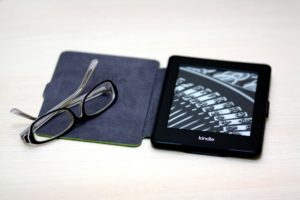
“I guess there are never enough books.” —John Steinbeck
* * *
The decision on whether to read a book in print or on an ebook device usually comes down to personal preference. But I came across something recently that made me think there may be more benefits to reading on paper rather than ebooks, so I thought I’d share that here.
First, a little data on the marketplace. I read this on Investopedia.com
According to the Association of American Publishers, e-book sales in the U.S. were down 1.5% during the first quarter of 2024 compared to the first three months of 2023, for a total of $255.6 million in revenue. They currently make up 12% of total consumer book sales. Their share of the market has been inching up over time, but hardcover and paperback books still rule the market, with approximately $3.3 billion and $3.1 billion in sales in 2023, respectively.
So it’s a competitive marketplace with each book type finding favor with different groups. Here are a few of the reasons people may choose one format over the other.
Ebooks
“Books are a uniquely portable magic.” —Stephen King
The word that comes up often when talking about ebooks is “convenience.”
- An ebook can be bought from an online store or checked out from the library and be available immediately.
- A single ebook reader can store thousands of books, and it’s much more portable than dragging around even a few paperbacks.
- An ebook can be read in the dark.
- The font size on an ebook can be changed.
In addition, Project Guttenberg provides thousands of ebooks downloadable at no cost.
Ebooks do have some disadvantages
- They require electrical power.
- They can cause eye strain.
Print Books
“A room without books is like a body without a soul”. – Cicero
Print books may not be as convenient as digital, but they do have advantages.
- Print books don’t need power.
- They’re easier on the eyes
- They provide an enjoyable tactile experience
But there’s more. I ran across an article on howlifeunfolds.com about the benefits of reading print books, and I’ve listed a few of those additional benefits below:
You absorb more information.
Readers of print books absorb and remember more of the plot than readers of e-books do, according to a study that was presented in Italy in 2014. In an earlier study, print readers also scored higher in other areas, such as empathy, immersion in the book, and understanding of the narrative. Scientists believe this effect is related to the tactile sensation of holding a book in your hands.
They help children become better readers, too.
Another study of young children between the ages of three and five revealed that kids had lower comprehension of the story when their parents read to them from an e-book as opposed to a print book.
They can help you sleep better.
When you’re winding down for the night, reading from a screen or scrolling through a social media app on your phone are bad ideas. Study after study has shown that the blue light from your screen can toy with your melatonin levels and circadian cycles, making it harder for you to fall asleep and making you feel groggier when you wake up.
Having a library at home is linked to higher academic achievement.
Students who have books at home are more likely to score higher on tests, according to a study of readers from 42 countries. It doesn’t matter how many books you have, but each additional book helps children perform better in school.
* * *
I like to read fiction on ebooks and nonfiction on paper. One thing I like about paper is the ability to write notes in the margins, something I’d never need to do in a novel. However, reading the article on howlifeunfolds.com, I may reconsider how to add more print books to my reading.
“There is more treasure in books than in all the pirate’s loot on Treasure Island.” —Walt Disney
* * *
So TKZers: What’s your preference in reading: print or ebooks? Do the benefits of print books listed above influence your decision?

“A delicious murder mystery” —Readers’ Favorite Reviews
Available at Amazon, Barnes & Noble, Kobo, Google Play, or Apple Books.

